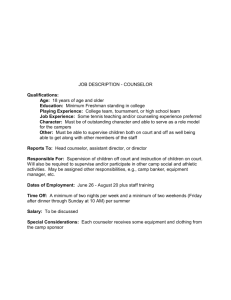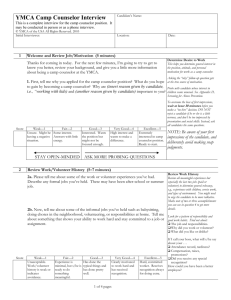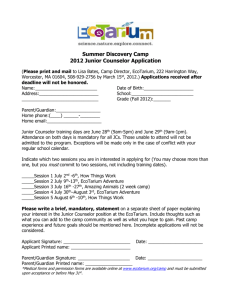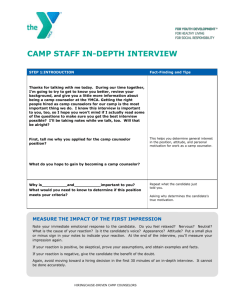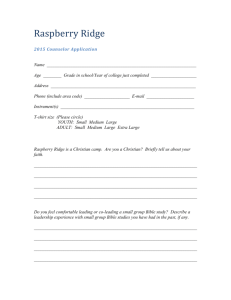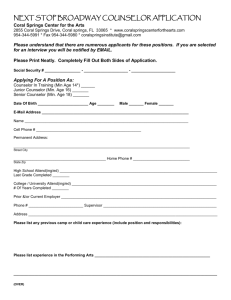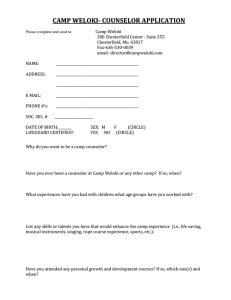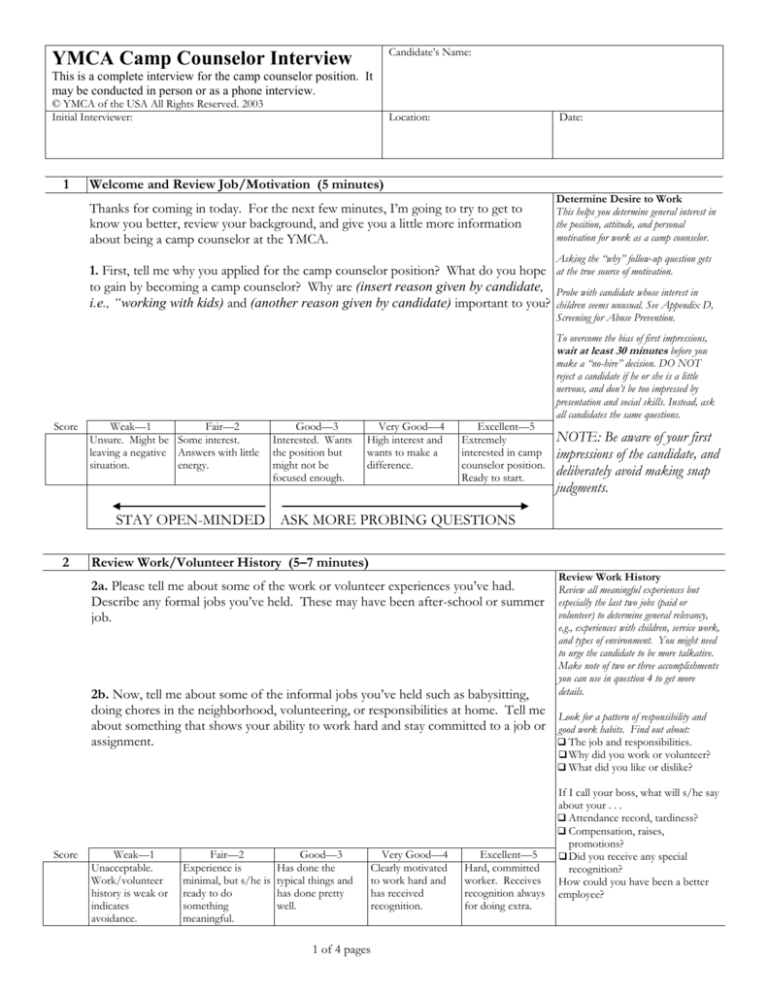
Candidate’s Name:
YMCA Camp Counselor Interview
This is a complete interview for the camp counselor position. It
may be conducted in person or as a phone interview.
© YMCA of the USA All Rights Reserved. 2003
Initial Interviewer:
1
Location:
Date:
Welcome and Review Job/Motivation (5 minutes)
Thanks for coming in today. For the next few minutes, I’m going to try to get to
know you better, review your background, and give you a little more information
about being a camp counselor at the YMCA.
Determine Desire to Work
This helps you determine general interest in
the position, attitude, and personal
motivation for work as a camp counselor.
Asking the “why” follow-up question gets
1. First, tell me why you applied for the camp counselor position? What do you hope at the true source of motivation.
to gain by becoming a camp counselor? Why are (insert reason given by candidate, Probe with candidate whose interest in
i.e., “working with kids) and (another reason given by candidate) important to you? children seems unusual. See Appendix D,
Screening for Abuse Prevention.
Score
Weak—1
Fair—2
Unsure. Might be Some interest.
leaving a negative Answers with little
situation.
energy.
Good—3
Interested. Wants
the position but
might not be
focused enough.
Very Good—4
High interest and
wants to make a
difference.
Excellent—5
Extremely
interested in camp
counselor position.
Ready to start.
To overcome the bias of first impressions,
wait at least 30 minutes before you
make a “no-hire” decision. DO NOT
reject a candidate if he or she is a little
nervous, and don’t be too impressed by
presentation and social skills. Instead, ask
all candidates the same questions.
NOTE: Be aware of your first
impressions of the candidate, and
deliberately avoid making snap
judgments.
STAY OPEN-MINDED ASK MORE PROBING QUESTIONS
2
Review Work/Volunteer History (5–7 minutes)
2a. Please tell me about some of the work or volunteer experiences you’ve had.
Describe any formal jobs you’ve held. These may have been after-school or summer
job.
Review Work History
Review all meaningful experiences but
especially the last two jobs (paid or
volunteer) to determine general relevancy,
e.g., experiences with children, service work,
and types of environment. You might need
to urge the candidate to be more talkative.
Make note of two or three accomplishments
you can use in question 4 to get more
details.
2b. Now, tell me about some of the informal jobs you’ve held such as babysitting,
doing chores in the neighborhood, volunteering, or responsibilities at home. Tell me Look for a pattern of responsibility and
about something that shows your ability to work hard and stay committed to a job or good work habits. Find out about:
assignment.
The job and responsibilities.
Why did you work or volunteer?
What did you like or dislike?
Score
S
S
Weak—1
Unacceptable.
Work/volunteer
history is weak or
indicates
avoidance.
Fair—2
Experience is
minimal, but s/he is
ready to do
something
meaningful.
Good—3
Has done the
typical things and
has done pretty
well.
Very Good—4
Clearly motivated
to work hard and
has received
recognition.
1 of 4 pages
Excellent—5
Hard, committed
worker. Receives
recognition always
for doing extra.
If I call your boss, what will s/he say
about your . . .
Attendance record, tardiness?
Compensation, raises,
promotions?
Did you receive any special
recognition?
How could you have been a better
employee?
3
Most Significant Accomplishments (Questions 3–6, 35 minutes)
Fact-Finding for
3a. I’d like you to think about a project or an accomplishment you’re very proud of. Accomplishments
This could be school-related, a volunteer activity, or something work-related. Try to Describe the project and the
circumstances.
select something that lets me see your ability to work with others, commit yourself
What did you actually do?
to a task, or something that gives me a sense of who you are and what you’re
What was the most satisfying part?
capable of doing.
What was the most challenging?
Why was it significant to you?
Give me an example of your taking
the initiative as part of this project.
How did you change/grow?
Did you receive any recognition?
What would you do differently?
When I call your supervisor…
Volunteer Activities
Why did you volunteer?
Was it what you expected?
What did you learn about yourself?
Cooperating/Working with Others
Describe the group you worked
with and give names.
Organizing/Planning Activities
Did you have to plan anything?
Describe how you organized
3b. Now select something that is completely different from what you just told me.
This could be with a team if your first example was as an individual, work if your
first example was volunteer, etc.
activities.
How could you do it better?
Problem Solving
How did you recognize the
problem?
Describe steps taken.
What would you do differently?
After 30 minutes, you may end the
interview if the candidate has a
weak work/volunteer history,
shallow accomplishments, or
limited capabilities. If you feel that
Score
4
Weak—1
Little evidence of
accomplishment.
No sense of
commitment.
Fair—2
Minimal
accomplishments.
Has worked when
necessary.
Good—3
Solid individual
and team
accomplishments.
Evidence of
commitment.
Very Good—4
Above average
individual and team
results and
commitment.
Excellent—5
Outstanding
accomplishments.
Good team skills
and organization.
someone is not qualified end the interview by
saying, “I believe I’ve gathered enough
information for now. We’re interviewing
several others in the next few days. After
we’ve had a chance to interview all the
candidates, we’ll follow up with you to
determine the next steps. Thank you for
coming in today. Do you have any
questions?”
Building One-on-One Relationships
4. Building strong one-on-one relationships with others is an important part of the
camp counselor position. Can you describe a specific situation where you’ve done
that on a project, job, volunteer basis, or perhaps just helped someone out?
Fact-Finding for Relationships
Find out:
- Who they helped.
- The nature of the relationship.
- Look for patterns of developing
meaningful relationships.
Can you give me an example:
When you helped someone
improve?
Score
Weak—1
Self-centered.
Cold. No
evidence of
helping or
understanding
others
Fair—2
Connects with
others, but not
naturally. Needs
to work at it or
requires urging.
Good—3
Makes
connections well
but takes some
time to do it.
Shares a little
about self.
Very Good—4
Makes
connections
quickly. Is
willing to share
about self when
asked.
2 of 4 pages
Excellent—5
Very sensitive to
needs of others.
Warm person.
Goes out of the
way to connect.
Why and how did you help that
person?
Someone came to you for
advice?
A social situation where you had
to meet and make friends quickly
with a group of strangers?
5
Playfulness
5. An important part of the counselor position is capturing kids’ attention. We’ve
found that the best counselors are playful. Can you give me a specific
example that demonstrates that you are fun to be with and your ability to start
activities spontaneously? Can you give me another specific example? Another?
Score
6
Weak—1
A bit stoic.
Doesn’t seem to
let go. Too
serious. Prefers
to watch or
direct.
Fair—2
Participates in
activities with
urging from
others. Sticks to
the schedule.
Good—3
Pretty playful.
Participates in
most activities at
his or her level
but rarely leads.
Very Good—4
Participates at the
level of the group
and occasionally
takes the lead.
Fact-Finding for Playfulness
Did you initiate the activity?
How did you stay involved?
How do you like to have fun?
What activities do you really like?
What activities do you dislike?
Excellent—5
Very playful.
Will lead and get
absorbed in
activities without
prompting.
Managing Stress, Frustration, and Anger
6. Camp can be very stressful. Managing your own stress and the stress of others is
important. Sometimes your patience with the kids can wear thin, and even the best
counselors can get annoyed. How do you manage stress? Can you give me a specific
example of the last time you were very tired, frustrated, or angry?
Fact-Finding for Managing
Stress
What were the circumstances?
How did you recognize stress?
What caused you to lose your
temper?
How did you express your
frustration/anger?
How did you feel about your
reaction?
What did you learn?
What would you do differently?
Problem Solving
Score
7
Weak—1
Doesn’t handle
stress or anger well,
or has never been
in a comparable
situation.
Fair—2
Reacts to stress/
anger of others
with urging.
Candidate is slow
to react to
personal stress.
Good—3
Recognizes stress
in others.
Average reaction
to stress/anger.
Limited
techniques.
Very Good—4
Handles similar
stress without
problems.
Understands
issues and deals
with them.
Excellent—5
Excellent
proactive
approach for self
and others. Has a
preventative
approach.
problem?
Describe steps taken.
What would you do differently?
NOTE: Watch for candidates who
can’t handle stress. See Appendix D,
Screening for Abuse Prevention.
Values and Integrity (Ask one or more—10 minutes)
7a. Can you give me a specific example of when you’ve had to apply your values in a
school, work, home, community, or social situation? (Ask for additional examples if
necessary.)
7b. Have you ever had a positive influence on someone else’s life as a result of your
beliefs or values? This could be a situation where you counseled or helped someone
through a difficult situation?
7c. Our camp places a very strong emphasis on _______________. Can you give me
a specific example of how your personal values are consistent with these goals?
Score
How did you recognize the
Weak—1
Values
inconsistent
with camp
philosophy
& values.
Fair—2
Values consistent
with camp but not
noticeable. Short
on responsibility.
Good—3
Values are consistent
with camp but not
modeled. Takes
responsibility when
asked.
Very Good—4
Solid evidence of
values that model
camp values—
takes initiative in
many ways.
3 of 4 pages
Excellent—5
Star performer.
Others see an
outstanding role
model who’s first
to volunteer.
Application
Describe the situation.
How were your values
challenged?
What happened as a result?
How did you feel about it?
What would you have done
differently?
How did others respond?
Positive Influence
What were the details of the
situation?
How did the other person
respond
What changed as a result of
your influence?
8
Problem-Solving Questions (Ask one of the following—10 minutes)
8a. Outstanding camp counselors often face difficult situations with a particular
group of campers. For example, on the third day of a camp week, you notice that a
couple of cliques have developed among your campers and that one or two campers
have been completely excluded from these groups. How would you go about solving
the problem?
8b. Outstanding camp counselors often face a difficult schedule of activities:
demanding physical effort, extremely hot or rainy weather, and long days and nights.
Faced with a very difficult day, how would you go about managing stress and taking
care of yourself to be ready to go at 100 percent the next day?
8c. Camp counselors experience a number of very personal issues with campers:
questions related to character, values, and family issues. For example, a group of
mixed-age boys are sitting by the pool and one of them is using some very graphic sex
talk to describe a teenage camper playing volleyball. What would you do?
Score
Weak—1
Poor
understanding of
issues. No sense
of priority. Not
open-minded.
Fair—2
Some
understanding of
the problem—
needs help in
finding any
solutions.
Good—3
Understands the
problem. Finds
solutions, asks
good questions.
Has seen similar
situation.
Very Good—4
Many good ideas.
Occasionally
anticipates
problems.
Understands key
issues.
Excellent—5
Always one step
ahead of
problems.
Creative ideas.
Teaches others.
The problem-solving question is
meant to initiate a give-and-take
discussion about the issues and
see how the candidate thinks.
Is the candidate:
___Consistent
___Flexible
___Rigid
___Unsure
___Interested in learning
Be Sure to Ask:
What do you need to know to
resolve these issues?
What resources would you
need?
Who would you involve?
How would you decide what to
do first?
If at first you didn’t succeed,
what would you do differently?
Do not expect answers that are 100
percent consistent with a policy or
procedure that a candidate may not
know.
Beware of candidates who seem overly
excited or disturbed by a “what if”
question related to sex. See Appendix
D: Screening for Abuse Prevention.
Share the Abuse Prevention Statement at this time.
9
Recruiting—Determine Interest at the End for a Good Candidate (5 minutes)
9. I’m impressed with your background (or, if you are not impressed, thank them for
taking the time to interview). Although we’re seeing other candidates, I would like
to know what you think about this opportunity. (pause) What questions do you have
about the job now?
Score
Weak—1
Not interested in
considering the
job.
Fair—2
Adequate level of
interest, but
cautious. Not
quick to move.
Good—3
Sincerely
interested in job.
Wants to move to
the next step.
Very Good—4
Wants the job for
good reasons. Is
ready to move
forward rapidly.
Excellent—5
Sees the job as a
great fit. Highly
motivated. Ready
to move rapidly.
Recruiting at the End of the
First Interview
How interested are you on a
scale of zero to 10? Why?
What do you need to know?
What do you like/dislike?
How do you think this job
meets the needs you mentioned
earlier?
What do you need for
compensation? What is your
availability?
Do you have any questions?
THANK YOU SO MUCH for spending this time with me today! The fact that you’d take this time means a
lot and shows your interest in this position. Thanks again!
10
Score
Measure First Impression
After you’ve finished the interview, rank the candidate’s personality and
interpersonal skills.
Weak—1
Fair—2
Good—3
Very Good—4
4 of 4 pages
Excellent—5
Measure First Impression
Again
Did candidate get better or
worse?
Become more/less nervous?
Open up or talk more?
Did you observe true personality
in accomplishments?
Were your biases controlled?
Did this change your decision?
Is true personality consistent
with job needs?

